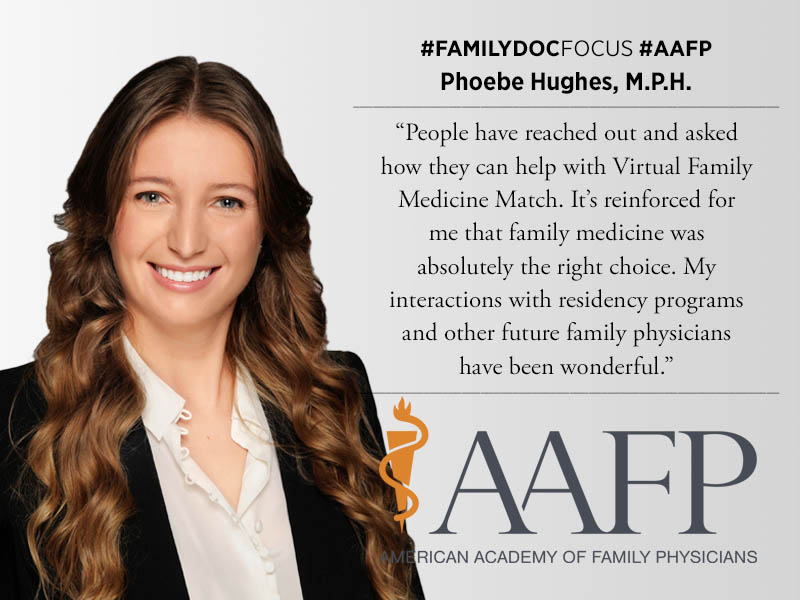Student Connects Peers, Residency Programs in Virtual Match
November 9, 2020, 1:22 pm David Mitchell -- When Phoebe Hughes, M.P.H., launched social media platforms to help connect medical students and family medicine residencies during a virtual match process, she thought her years of experience marketing her small jewelry business on Instagram would help with engagement and growing a following.

She needn’t have worried about exposure.
“The family medicine community is so strong,” said Hughes, a fourth-year student at Florida International University’s Herbert Wertheim College of Medicine. “People find the page or hear about it, and then they tell 10 friends. Word of mouth has been a more powerful tool than social media algorithms.”
In the 2020 National Resident Matching Program, 4,335 medical students and graduates matched to family medicine residency programs. Since launching in September, Virtual Family Medicine Match has gained more than 2,000 followers on Instagram and more than 500 on Twitter.
Each day from mid-September through October, Hughes let a different family medicine residency program take over the Instagram account. Those takeovers allowed programs to show off their facilities and gave potential applicants a chance to ask the programs questions related to things like global health opportunities, community outreach and advocacy.
Hughes said she hopes her platform helps level the playing field for smaller programs that might have smaller followings on their own social media accounts.
“This is a chance for them to reach about half the pool of applicants on one platform,” she said.
Now Hughes is giving programs a chance to offer a look at a day in the life of their residents. That’s important for students, who won’t be able to do in-person interviews this match season because of the pandemic. Instead, programs can present themselves through photographs, videos and infographics.
“From the time you wake up as a resident in a program, what does that look like in terms of your schedule, number of patients, rotations, commute?” Hughes said. “If you’re a student, you can see what life is like in that program. You can ask yourself, ‘Could I see myself there? Do they prepare residents to be the kind of doctor I want to be?’”
For Hughes, that means finding a program that can help her train to be a full-scope, rural family physician.
“That’s not just a buzzword for me,” she said. “I like to have a lot of things on my plate at the same time. A full-scope residency is what will allow me to do that.”
Hughes’ mother is a psychiatrist whose practice experience included time in rural North Dakota.
“That really influenced me,” she said. “Hearing her stories about connecting with patients really resonates with me. You can become people’s confidant, physician and trusted friend. I’m interested in community-based work that will improve patient outcomes and improve the community where I live.”
Hughes has taken leadership roles as a medical student, serving on committees and other volunteer roles for the American Medical Student Association and the American Medical Women’s Association. She also led the family medicine interest group at her school. Until now, her work on Virtual Family Medicine Match has largely been done anonymously. Hughes said she worked on the platforms for five hours a day when she was creating them and now spends about an hour a day maintaining them.
“People have reached out and asked how they can help with Virtual Family Medicine Match,” said Hughes, who hopes to identify a third-year medical student to take over the platforms next year and meanwhile is looking for help spreading the word about the account. “It’s reinforced for me that family medicine was absolutely the right choice. My interactions with residency programs and other future family physicians have been wonderful.”